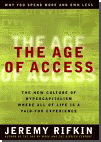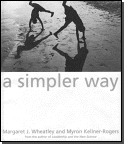 | ||||
 The Age of Access
The Age of AccessThe New Culture of Hypercapitalism, Where All of Life Is a Paid-For Experience
Jeremy Rifkin
Click here to purchase now through Amazon.com
If you think your company is in the business of marketing products, services or even entertainment experiences, then you must read this book. Rifkin makes a compelling case that we have entered the "Age of Access". And, importantly, access to intellectual capital - individuals at the forefront of development and their concepts, ideas, knowledge, and wisdom - commands the ultimate premium. However, do not pick up this book if you are looking for the magic formulas or seven easy steps to transform your business to be "access-economy" ready. It is not that kind of book. Rather, Rifkin takes you through a thorough historical analysis of economic development in Part I of the book and a light postmodern philosophical romp in Part II. However if you are intellectually curious or, alternatively, patient and persevering, you will be aptly rewarded with thought provoking gems. In both parts of the book, Rifkin foregrounds relationships, networks, communities and communications and their importance in this "Age of Access". But as he points out in Part II, it is important that these are not exclusively cyberspace-facilitated interactions. Rather, he believes we must find ways to maintain the face-to-face, social fabric of our lives and thereby our humanity.
There are many important blockbuster, business implications here for those willing to do their own
intellectual work in exploring Rifkin's proposals.
- Linda
B. Joseph Pine II & James H. Gilmore
Click here to purchase now through Amazon.com
Pine and Gilmore also believe we have left the world of products and services behind. However, they have a slightly alternative vision of the new economic offerings. Rather than access, they believe people seek experiences. And utilizing a theatrical metaphor and illustrative examples, they guide us toward actions - essentially careful staging of details that influence customer interaction -- that transform current offerings to experiences. For those that fault Rifkin's book for not having concise action steps, this book might better suit your needs.
However, in the final two chapters of the book, Pine and Gilmore inform us that experiences are already at
risk of becoming commoditized. What today's consumers seek are transformations and their "elicitors,"
businesses or individuals who can guide transformations by identifying the consumers' aspirations,
facilitating the processes and sustaining the results. If you are in the service or experience industry, this
book provides thought provoking material as you plan for business migration.
- Linda
Kevin Kelly
Click here to purchase through Amazon.com
As we enter the 21st century, our business environment is writhing with network-induced change. If you have time to read just one book that prophesies about where such dramatic change might lead, this is THE book to read. Here Kelly brings together his technological expertise (he is editor-at-large of Wired Magazine) and a systems perspective to make some excellent observations about change - particularly the impact of web-based technology on the nature of business in the future.
Utilizing analogies from ecological systems, biological systems, and the new sciences, Kelly forges some
important links between technology, business, and science not previously articulated with such clarity.
The only tie missing is the linkage to the literature of postmodernity (a project that Rifkin takes on in
"The Age of Access"). This is a very innovative and creative read.
Every person that picks this book up is sure to get at least one spine-tingling, revolutionary business idea
that is worth the price and time. - Linda
Margaret J. Wheatley & Myron Kellner-Rogers
Click here to purchase now through Amazon.com Chaos. Complexity. Turbulence. Continuous change. So often talked about, they are almost cliched expressions. This IS the world we live in, and we know it to be true. There are countless books expounding on the business implications of this environment and prophesizing about new ways of organizing work. However, one should not lose sight of the fact that the work world is actually humans interacting and in relationship with one another. And, ultimately, it is human change that fuels and supports change in organizational systems. In this book, Meg Wheatley captures the essence of "being" in such a dynamic, pulsating environment. It requires a more fluid person willing to play, risk, explore and discover; a person willing to open themselves up to new and multiple experiences; a person who does not view self as rigidly defined but, rather, in continuous process. Only when organizations are inhabited by people who embrace this way of being, will organizations be capable of continuous change.
Approachable and simply written, with provocative photos and poetic refrains, this is one of the most
important books in our reference library. Complete with our own additions of colorful post-it tabs,
highlighted passages and margin notes, we return to it again and again to rethink and internalize.
We only hope that everyone we engage with in our social and professional worlds finds it equally
enlightening! - Linda
Geoffrey Moore
Click here to purchase through Amazon.com
In this book, Geoffrey Moore argues that innovation in today's business environment is as important to traditional Fortune 500 corporations as it is to smaller Internet startups. Particularly, when the corporation's long-standing value proposition starts to fade in the context of new paradigms, shifting customer preferences, and the realities of today's Internet-driven society. However, unlike many pundits, Moore believes these same corporations, with the right strategy and execution, can leverage the same market dynamics to prosper and thrive. If you work at a large, well-established corporation and are trying to figure out what to do about the Internet, this book is for you. Moore, who virtually defines high-tech marketing in "Crossing the Chasm", believes that the friction between the old economy and the new economy creates a fault line beneath all corporations. In response, the book describes new metrics and models for the type of strategy and organizational focus required for each stage of market development. I particularly liked the notion that organizations should focus on core competencies that are rewarded today -- not historical competencies now possessed by all competitors or original competencies that can be outsourced. Also compelling was the chapter that steps through the multiple tiers of the competitive advantage hierarchy. "Living on the Fault Line" offers corporations a framework for action illustrated with examples of correct, well-reasoned strategies. This book hit me like a ton of bricks. I highly recommend it. - Russ Also Available: The NuVantage Market Development Bibliography
|
||||



